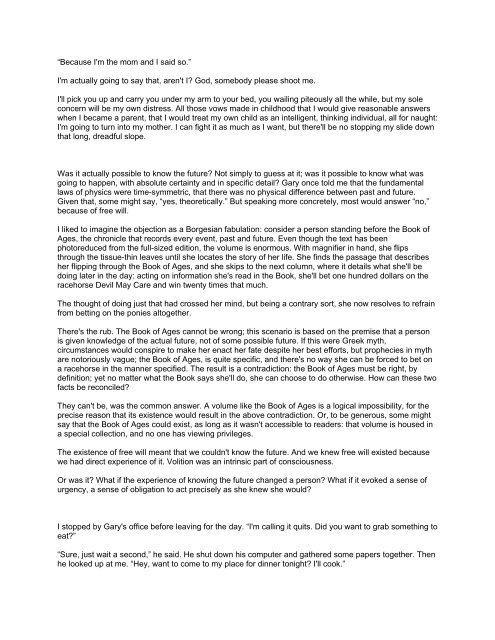Create successful ePaper yourself
Turn your PDF publications into a flip-book with our unique Google optimized e-Paper software.
“Because I'm the mom and I said so.”<br />
I'm actually going to say that, aren't I? God, somebody please shoot me.<br />
I'll pick you up and carry you under my arm to your bed, you wailing piteously all the while, but my sole<br />
concern will be my own distress. All those vows made in childhood that I would give reasonable answers<br />
when I became a parent, that I would treat my own child as an intelligent, thinking individual, all for naught:<br />
I'm going to turn into my mother. I can fight it as much as I want, but there'll be no stopping my slide down<br />
that long, dreadful slope.<br />
Was it actually possible to know the future? Not simply to guess at it; was it possible to know what was<br />
going to happen, with absolute certainty and in specific detail? Gary once told me that the fundamental<br />
laws of physics were time-symmetric, that there was no physical difference between past and future.<br />
Given that, some might say, “yes, theoretically.” But speaking more concretely, most would answer “no,”<br />
because of free will.<br />
I liked to imagine the objection as a Borgesian fabulation: consider a person standing before the Book of<br />
Ages, the chronicle that records every event, past and future. Even though the text has been<br />
photoreduced from the full-sized edition, the volume is enormous. With magnifier in hand, she flips<br />
through the tissue-thin leaves until she locates the story of her life. She finds the passage that describes<br />
her flipping through the Book of Ages, and she skips to the next column, where it details what she'll be<br />
doing later in the day: acting on information she's read in the Book, she'll bet one hundred dollars on the<br />
racehorse Devil May Care and win twenty times that much.<br />
The thought of doing just that had crossed her mind, but being a contrary sort, she now resolves to refrain<br />
from betting on the ponies altogether.<br />
There's the rub. The Book of Ages cannot be wrong; this scenario is based on the premise that a person<br />
is given knowledge of the actual future, not of some possible future. If this were Greek myth,<br />
circumstances would conspire to make her enact her fate despite her best efforts, but prophecies in myth<br />
are notoriously vague; the Book of Ages, is quite specific, and there's no way she can be forced to bet on<br />
a racehorse in the manner specified. The result is a contradiction: the Book of Ages must be right, by<br />
definition; yet no matter what the Book says she'll do, she can choose to do otherwise. How can these two<br />
facts be reconciled?<br />
They can't be, was the common answer. A volume like the Book of Ages is a logical impossibility, for the<br />
precise reason that its existence would result in the above contradiction. Or, to be generous, some might<br />
say that the Book of Ages could exist, as long as it wasn't accessible to readers: that volume is housed in<br />
a special collection, and no one has viewing privileges.<br />
The existence of free will meant that we couldn't know the future. And we knew free will existed because<br />
we had direct experience of it. Volition was an intrinsic part of consciousness.<br />
Or was it? What if the experience of knowing the future changed a person? What if it evoked a sense of<br />
urgency, a sense of obligation to act precisely as she knew she would?<br />
I stopped by Gary's office before leaving for the day. “I'm calling it quits. Did you want to grab something to<br />
eat?”<br />
“Sure, just wait a second,” he said. He shut down his computer and gathered some papers together. Then<br />
he looked up at me. “Hey, want to come to my place for dinner tonight? I'll cook.”


